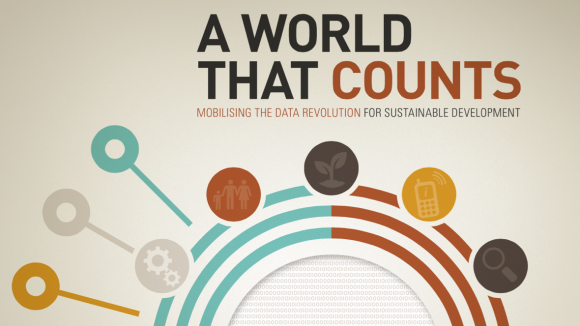Press Release
(6 November 2014) The Secretary-General's Independent Expert Advisory Group on a Data Revolution for Sustainable Development (IEAG) met today with the UN Secretary-General Ban Ki-moon to hand over their report A World That Counts: Mobilising The Data Revolution for Sustainable Development.
The group consists of over 20 international experts, asked by the UN Secretary General to propose ways to improve data for achieving and monitoring sustainable development.
The report highlights two big global challenges for the current state of data: the challenge of invisibility, for instance gaps in what we know and when we know it, and the challenge of inequality, including the gaps between those who know and those who do not know what they need to know make their own decisions.
The IEAG report makes specific recommendations on how to address these challenges, calling for a UN-led effort to mobilise the data revolution for sustainable development:
1. Fostering and promoting innovation to fill data gaps. New technologies offer new opportunities to improve data, if they are used for the common good. The group proposes a programme for experimenting with how traditional and new data sources (including big data) can be brought together to provide better and faster data on sustainable development, and developing new infrastructures for data development and sharing (such as a "world statistics cloud"), to share innovations that improve the quality and reduce costs of producing public data.
2. Mobilizing resources to overcome inequalities between developed and developing countries and between data-poor and data-rich people. The group stresses the need for increased funding and resources, used both to develop national capacity and global data literacy, and for public-private partnerships to leverage private sector resources and knowledge in the global interest. The international conference in July 2015 to discuss financing for new Sustainable Development Goals provides an opportunity for this.
3. Leadership and coordination to enable the data revolution to play its full role in the realization of sustainable development. The group proposes a global effort to improve cooperation between old and new data producers, to ensure the engagement of data users, and to develop global ethical, legal and statistical standards to improve data quality and protect people from abuses in a rapidly changing data ecosystem.
Co-chair of the Independent Expert Advisory Group, Enrico Giovannini, said today during the presentation of this report: "We live in a world that faces rapidly-evolving humanitarian and development challenges, as the Ebola epidemic so tragically proves. Governments, companies, NGOs and individuals need good data to know where problems are, how to fix them, and if the solutions are working. But current data are not good enough. Too many people and issues are not counted or measured, there are huge and growing inequalities between the information-rich and the information-poor. Big gaps are also opening up between the private and the public sector in how data are collected and used. We have an opportunity now to mobilise political will, financial resources and new technologies to fix this. The UN has a crucial role, working with governments, civil society and the private sector, to make the data revolution a revolution for sustainable development. The world we want is a world that counts and we can build it."
For more information about the mandate of the Group, to download the report and to read about 30+ existing initiatives on data revolution-related issues, please visit www.undatarevolution.org.
Any queries should be sent to:
Jennifer Poole / jenny unglobalpulse.org /
unglobalpulse.org / ![]() + 1 347 327 6568.
+ 1 347 327 6568.
Anna Ortubia / anna.ortubia undp.org /
undp.org / ![]() +1 212 906 5964.
+1 212 906 5964.
Notes to editors:
1. Interviews available on request with Claire Melamed, Secretary of the Independent Expert Advisory Group (English language), Enrico Giovannini Group Co-chair (Italian, English, French). Other interviews with IEAG group members available.
2. The full report is available on www.undatarevolution.org
3. The report is the work of the UN Secretary-General's Independent Expert Advisory Group on the Data Revolution for Sustainable Development: Enrico Giovannini (Co-Chair, Italy), Robin Li (Co-Chair, China), T.C.A. Anant (India), Shaida Badiee (Iran), Carmen Barroso (Brazil), Robert Chen (United States), Choi Soon-hong (Republic of Korea), Nicolas de Cordes (Belgium), Fu Haishan, (China), Johannes Jütting (Germany), Pali Lehohla (South Africa), Tim O'Reilly (United States), Sandy Pentland (United States), Rakesh Rajani (Tanzania), Juliana Rotich (Kenya), Wayne Smith (Canada), Eduardo Sojo Garza-Aldape (Mexico), Gabriella Vukovich (Hungary), Alicia Barcena (ECLAC), Robert Kirkpatrick (Global Pulse), Eva Jespersen (UNDP), Edilberto Loaiza (UNFPA), Katell Le Goulven (UNICEF), Thomas Gass (ex officio) and Amina J. Mohammed (ex officio)
Bios here ://www.undatarevolution.org/about-ieag/datarev-group-members/



